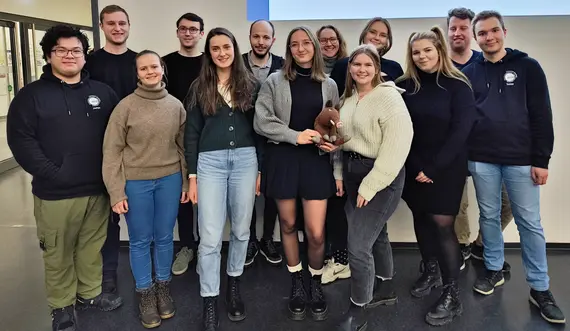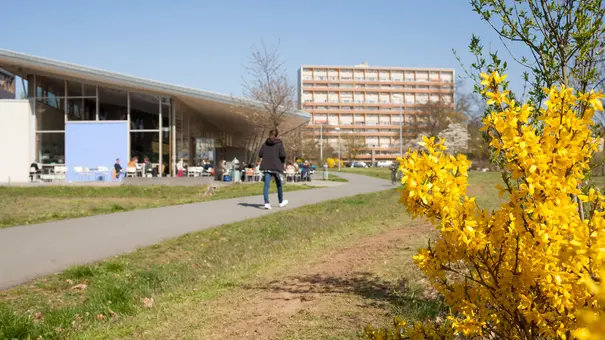University of Bamberg
Selected committees and responsibilities at the University of Bamberg
- University administration
- Senate
- Head of faculty
- Faculty Council
- Student representation (StuVe)
- WIAI student council
University administration

The Executive Board of the University of Bamberg consists of the President, the Vice Presidents and the Chancellor.
The President, Prof. Dr. Kai Fischbach, is the Chairman of the University Executive Board and the Extended University Executive Board, and he is the superior of the academic and artistic civil servants working at the University as well as the Chancellor. He is also responsible for contacts between the university, the city and the business community.
The Chancellor, Dr. Dagmar Steuer-Flieser, heads the Central University Administration, is responsible for the budget and is the superior of all university employees. She is also responsible for the implementation of the University's legal and administrative matters, the coordination of construction measures and the house rules.
The Vice Presidents each have specific areas of responsibility: Prof. Dr. Sabine Vogt is responsible for internationalization, equality and diversity issues. Prof. Dr. Thomas Saalfeld is Chairman of the Standing Committee for Research and Young Academics and is responsible for the promotion of young academics, research funding and research transfer. Prof. Dr. Stefan H?rmann is Vice President for Teaching and Students and thus responsible for quality assurance and development in studies and teaching, the further development of study programs, the promotion of students and the improvement of study conditions. He is also Chairman of the Standing Committee for Studies and Teaching.
Together, they work to determine the strategic direction of the university and ensure its operational management.
Senate

The Senate of the University of Bamberg is an important body made up of members from various status groups. It has decision-making and advisory functions and makes important decisions, such as the establishment or discontinuation of degree programs and the definition of research priorities. The Senate is important for students as it represents their interests and influences campus life. The student representatives in the Senate consist of two members who are elected by the students in the annual university elections. The Senate is made up of a total of 11 members, including 6 professors, 1 academic staff member, 1 other staff member, 2 students and the representative for equal opportunities for women in science and the arts.
Head of faculty

The faculty management of the Faculty of Information Systems and Applied Computer Science (WIAI) at the University of Bamberg consists of the Dean, the Dean of Research, the Dean of Studies and the Transfer Officer. The current Dean is Prof. Dr. Andreas Henrich. The Dean of Research is Prof. Dr. Thorsten Staake, the Dean of Studies is Prof. Dr. Daniel Beimborn and the Transfer Officer is Prof. Dr. Michael Engel. The faculty management is responsible for the strategic orientation and operational management of the faculty, including quality assurance and development in studies and teaching.
The Faculty Management is actively supported by the Dean's Office team, which includes the Examination Boards, the Career & International Center, the Office of the Dean of Studies and Social Media Management.
Faculty Council

The Faculty Council of the Faculty of Information Systems and Applied Computer Science (WIAI) at the University of Bamberg is an important body consisting of professors, academic staff, other employees and students. The students play an important role in the Faculty Council, as they represent the interests, wishes and concerns of the students. The two students who receive the most votes on the student council list in the university elections sit on the faculty council of their faculty.
The Faculty Council makes all important decisions relating to the WIAI faculty. These include, for example, changes to the examination regulations, in which area new courses are included in the module handbook or the appointment of new professors.
Student representation (StuVe)

The student representation of the University of Bamberg consists of three main bodies: the student councils on faculty level, the political groups and the student senators. Each of the four faculties has a student council consisting of seven to nine elected members. The student councils are responsible for day-to-day student advising, organizing events and representing students on various committees.
The student council is important because it represents the interests of students and influences campus life. It works on a wide range of topics, from vegan options in the canteen to cultural events and examination regulations.
A total of 35 elected members belong to the student parliament. The exact number of students involved in the student parliament can vary, as non-elected people can also be directly involved.
WIAI student council

The Student Council for Information Systems and Applied Computer Science (WIAI) at the University of Bamberg represents the students of the WIAI faculty. It consists of around 30 active members, seven of whom are elected in the university elections in the summer semester.
The WIAI student council has a variety of tasks. It sends delegates to committees and boards at various levels of the university and represents the interests, wishes and concerns of the students. It helps students whenever there are problems with the university administration, teaching staff and other university employees.
In addition, the WIAI student council organizes various events to make everyday life at the university more interesting. These include tutorials (e.g. on LaTeX), celebrations (such as the Christmas party or the summer party) and weekly meetings.
The WIAI student council is important for students as it acts as their representative body and represents their interests. It improves the study conditions at the University of Bamberg and the WIAI faculty and offers a platform for exchange and networking among students.
Sites
ERBA

ERBA is home to the majority of the WIAI faculty. Most lectures and tutorials on (applied) computer science and business informatics take place here for WIAI students.
Feki

The Feki is home to the chairs of social sciences and economics. WIAI students mainly attend courses such as Introduction to Business Administration, Private Law or Mathematics in Economics.
Innenstadt / City center

The GuK and Huwi faculties are located in the city center. Some language courses or key skills modules, which are also taken by WIAi students, take place here. The popular Mensa Austra?e and TB4, also known as the Glasbib, are also located here.
Further locations

In addition to the three large areas, there are numerous other university buildings, such as the examination room at Kapellenstra?e 13 or Gutenbergstra?e 13, where other WIAI chairs are located. Details can be found in the complete location overview.
History and current news

University of Bamberg
The University of Bamberg was founded in 1647 as Academia Bambergensis when Bamberg's Prince-Bishop Melchior Otto Voit of Salzburg added the faculties of Philosophy and Theology to the then Jesuit College. In 1773, it became a classic four-faculty university and was given the name Universitas Ottoniano-Fridericiana. Despite the closure of the university in 1803, theological and philosophical studies were able to continue. After the Second World War, the Philosophical-Theological University and the Bamberg University of Education, founded in 1958, were merged in 1972 to form the Gesamthochschule Bamberg. Finally, the comprehensive university became a university again in 1979 and has borne the current name Otto-Friedrich-Universit?t Bamberg since 1988.

WIAI Faculty
The Faculty of Information Systems and Applied Computer Science (WIAI) at the University of Bamberg was founded on October 1, 2001 and combines Information Systems with Applied Computer Science and classical Theoretical and Practical Computer Science. In the last five years, the faculty has undergone remarkable development, particularly as a result of the Hightech Agenda Bayern, which has created new professorships in the fields of Information Systems and Artificial Intelligence. This development has had a positive impact on studies and teaching and has more than doubled the number of professorships at the faculty. Current research focuses include the development of comprehensible and transparent intelligent technologies that aim to support people through AI.